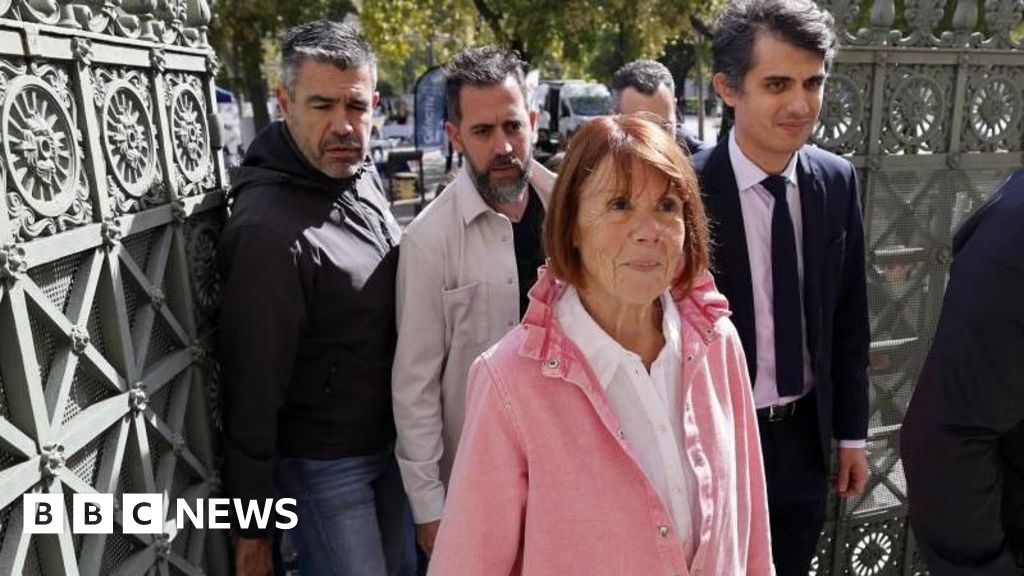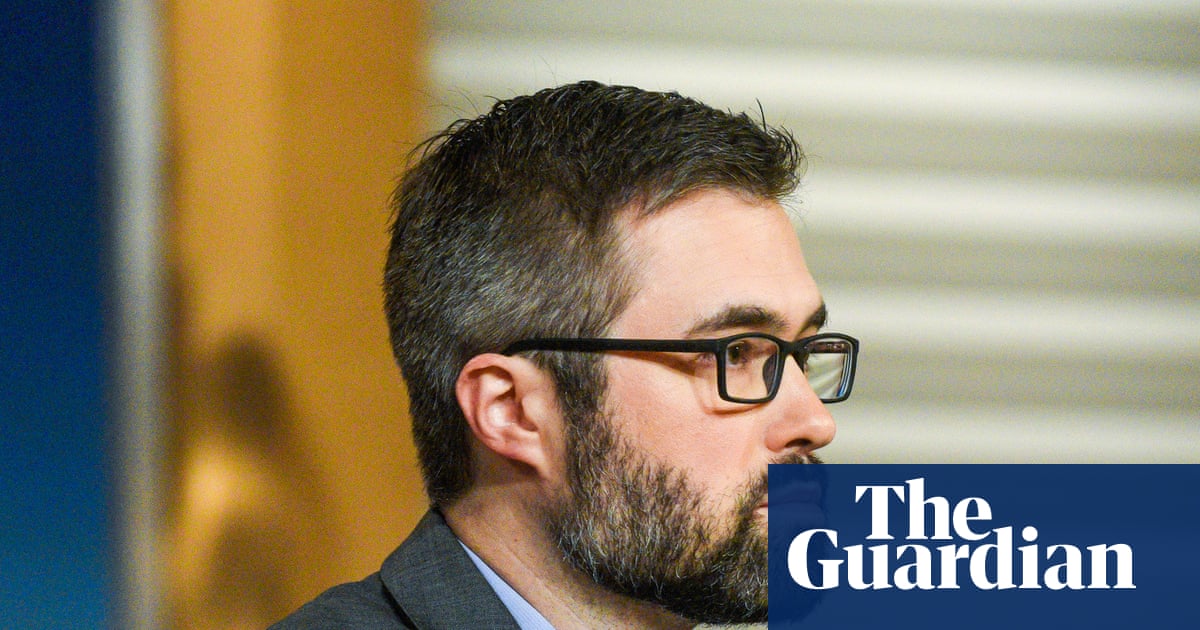
U.S. will host Qatari Air Force facility in Idaho, Defense Secretary Hegseth says
Mixed, with concern and skepticism predominating. Many readers express worry about the potential implications of hosting a Qatari Air Force facility in the U.S., citing security concerns and questions about the nature of the arrangement. There's a palpable sense of unease regarding the potential for increased foreign influence and the strategic implications of the move.
Wall Street drops to its worst day since April after Trump's threats of tariffs shatter its calm
There’s a pervasive sense of disbelief and frustration—many feel manipulated by erratic market movements driven by a single individual’s whims. A strong undercurrent of anger is directed at the perceived lack of accountability, with a feeling that the financial system is being exploited for personal gain. The concern is not just about market fluctuations, but about the potential consequences for ordinary investors and the broader economy, fuelled by the suspicion that decisions are being made without proper oversight or understanding of the long-term impacts. Alongside this cynicism, there’s a noticeable desire for stability and a yearning for rational decision-making. Many express a desire for the market to be governed by sound economic principles, rather than impulsive actions. The general sentiment leans towards a distrust of the current system and a hope that a more responsible approach will eventually prevail, though many acknowledge the difficulty of achieving this amidst ongoing market volatility and the influence of powerful, self-serving interests.

Drake's lawsuit over Kendrick Lamar diss track is dismissed
The overwhelming sentiment expressed in these comments is that Drake’s legal attempt to challenge the diss track battle was a resounding failure and has cemented his status as a figure of ridicule. Readers overwhelmingly agree that Drake was decisively defeated, not just musically but also in terms of public perception. The lawsuit dismissal is viewed as a final, embarrassing acknowledgement of his loss, with many highlighting the Super Bowl moment and the stadium’s chant of “A minor” as the definitive marker of his downfall. Furthermore, there’s a strong sense of amusement and schadenfreude directed towards Drake. The comments reveal a collective feeling that he overreacted and is clinging to a futile legal battle. The discussion shifts to a broader analysis of his career trajectory, pointing to a series of missteps and a tendency to provoke conflict, ultimately leading to a dramatic and public humiliation.

Carney announces long-awaited automatic tax filing, makes school food program permanent
There’s a pervasive sense of frustration and disillusionment with the current political climate, largely fueled by a feeling that politicians are out of touch and prioritize partisan battles over addressing real issues. Many express cynicism towards established parties, believing they’re simply rehashing the same arguments without offering genuine solutions. A key driver of this sentiment is the perception that politicians are primarily focused on scoring points rather than serving the public interest. The automatic tax filing change represents a positive step, but there’s a deep-seated weariness with complex systems and bureaucratic hurdles. Despite the negativity, a glimmer of hope exists in the desire for competent leadership and a willingness to consider diverse perspectives. People are yearning for someone who can navigate complex challenges with intelligence and integrity, and who is willing to engage in constructive dialogue. The desire for more pragmatic, evidence-based policy, and a move away from divisive rhetoric is widespread.

UPS is 'disposing of' U.S.-bound packages over customs paperwork problems
A widespread sense of frustration and disillusionment permeates discussions surrounding the current tariff situation. Many feel unfairly burdened by unexpectedly high shipping costs, particularly when importing goods from overseas, and perceive the tariffs as a costly burden imposed on consumers and small businesses. There’s a strong sense of wasted resources – money and time – spent navigating complex and often contradictory regulations. Many believe the current system is inefficient and disproportionately harms those who rely on international trade. Beyond the immediate financial impact, a significant undercurrent of anger and resentment exists regarding the perceived political motivations behind the tariffs. There’s a feeling that these policies are driven by ego and a desire to appear “winning,” rather than by sound economic principles. This fuels a broader dissatisfaction with the political climate and a feeling that the interests of ordinary Americans are being ignored in favor of a protectionist agenda.
Powerful blast at Tennessee military explosives plant rattles homes miles away
There’s a palpable sense of shock and disbelief surrounding this explosion. Many are expressing concern for the missing employees and grappling with the sheer scale of the devastation. There’s a strong feeling of unease, fueled by the plant’s role in manufacturing specialized munitions and the unsettling history of previous incidents. Many are instinctively suspicious, leaning towards the possibility of sabotage, particularly given the recent geopolitical tensions and the plant’s connection to military-grade explosives. Despite the anxieties, there’s also a thread of resilience and hope. People are offering support to the community and expressing a desire for answers, urging authorities to thoroughly investigate the circumstances of the explosion and ensure the safety and well-being of those affected. The combination of fear, uncertainty, and a determination to uncover the truth creates a complex and emotionally charged atmosphere.

Man who appealed Pelicot rape conviction handed longer jail term
The overwhelming sentiment expressed in these opinions is one of outrage and condemnation towards the defendant and those involved. There’s a strong belief that he manipulated the legal system by attempting to portray himself as a victim, exploiting a misunderstanding of consent within a specific, problematic subculture. The core feeling is that his attempts to justify his actions – using phrases like “I’m a victim” and “rape means forcing someone” – are deeply flawed and demonstrate a lack of remorse. Many believe he’s prioritizing his own self-preservation over acknowledging the severe harm he inflicted. Beyond the defendant, the opinions reveal a deep distrust of the men who participated in the attacks, deemed “shitty, evil people” who knowingly exploited a vulnerable woman. The collective feeling is that they should have reported the crime and that the legal system should be severely punishing them. Overall, there's a sense that justice has not been served and a strong desire for accountability, fueled by the belief that the defendant's actions were inherently wrong and manipulative.

Retired U.S. Army officer sentenced to nearly 6 years for sharing classified info on dating site
The overwhelming sentiment is one of disbelief and frustration regarding the relatively light sentence received by the retired officer. Readers express a strong sense that the situation is deeply troubling, highlighting a perceived double standard where others, notably figures like Donald Trump and Peter Hegseth, have engaged in similar behavior with seemingly no repercussions. There’s a widespread feeling that the justice system is failing to hold individuals accountable for sharing classified information, particularly when contrasted with the lenient punishment compared to other instances of potential treason. Many commenters believe the situation exposes significant vulnerabilities in government security protocols and a concerning shift in priorities, suggesting that personal gain and access to “hot babes” are prioritized over national security. The repeated references to Signal, dating apps, and the absurdity of using a dating site to solicit classified information underscore a sense of disbelief and a concern that the focus has shifted from protecting sensitive information to attracting attention and potential romantic interests.

Tony Blair met with Jeffrey Epstein while prime minister
A pervasive sense of deep suspicion and outrage surrounds the revelations of Tony Blair’s connection to Jeffrey Epstein. Readers express a strong belief that powerful figures, including government officials and prominent politicians, were involved in a deliberate cover-up to protect their reputations and maintain access to elite circles. There’s a feeling that the truth is being actively suppressed, with accusations of deliberate obfuscation and a concerted effort to deny or minimize the extent of the scandal. Many express skepticism towards official narratives and a willingness to consider more radical explanations, suggesting a network of corruption and a willingness to engage in morally reprehensible behavior. Beyond the specific details of the Epstein affair, a broader sense of disillusionment with political leaders and the established order fuels the reaction. The comments reveal a belief that those in positions of authority are often compromised and that traditional narratives of good governance are fundamentally flawed. The comments reflect a deeply cynical view of power and a suspicion that the individuals involved are not simply guilty, but actively engaged in a system of concealment and exploitation.

Macron reappoints Lecornu as French PM after days of turmoil
The overwhelming sentiment expressed in these comments reflects deep frustration and cynicism regarding the French political system. There’s a pervasive belief that the situation is a cyclical, absurd repetition of failed attempts, with Macron stubbornly clinging to power despite plummeting approval ratings and a lack of genuine political progress. The re-appointment of Lecornu is seen as not just a mistake, but a testament to a dysfunctional system where the president wields excessive power and is unwilling to compromise, essentially trapping the country in a pointless loop of instability. Ultimately, the comments portray a sense of hopelessness and disillusionment. People feel the country is collapsing due to a combination of poor leadership, entrenched political dysfunction, and a refusal to address fundamental problems. The repeated cycle of resignations and reappointments, coupled with a perceived unwillingness to tackle crucial issues, has fostered a strong sense that the established order is broken and that meaningful change is unlikely.
National Guard troops seen patrolling in Memphis alongside local police
The prevailing sentiment is overwhelmingly critical and deeply concerning. There’s widespread disgust at the deployment of the National Guard to American cities, viewed as a performative and ultimately ineffective attempt to appease a political base. The action is perceived as a dangerous escalation, blurring the lines between civilian and military roles and raising serious questions about the erosion of civil liberties. Many feel it’s a cynical move designed to distract from deeper systemic issues – poverty, inequality, and inadequate social services – and a troubling sign of increasing authoritarian tendencies. Despite pockets of support, the dominant reaction is one of alarm and rejection. The use of military force against American citizens is seen as illegitimate and unsettling, fueling anxieties about a shift towards a more militarized and less democratic society. The core feeling is a sense of betrayal – a feeling that the government is prioritizing political expediency over the well-being and rights of its own people.
US buys Argentine pesos, finalizes $20 billion currency swap
A pervasive sense of anger, frustration, and cynicism dominates the opinions expressed. There’s a strong feeling that the bailout of Argentina, and the associated investment decisions, are deeply unfair and serve the interests of wealthy individuals – notably those with ties to figures like Trump and Jared Kushner – at the expense of American farmers and the broader public. Many view the situation as emblematic of a corrupt system where political connections and personal gain override genuine concern for the well-being of ordinary citizens. The widespread criticism highlights a perceived lack of accountability and a disregard for the consequences of these decisions. Ultimately, the collective sentiment is one of disillusionment and resentment. The opinions reveal a belief that the government is actively enabling a class war, prioritizing the enrichment of a small elite while neglecting critical needs and exacerbating existing inequalities. The repeated references to manipulation, corruption, and a lack of transparency underscore a deep distrust of political institutions and a feeling that the system is rigged against the majority.

Venezuelan opposition leader María Corina Machado wins Nobel Peace Prize
The prevailing sentiment is overwhelmingly critical of the Nobel Committee’s decision to award the prize to María Corina Machado. A significant portion of commenters views the selection as deeply problematic, largely due to Machado’s explicit dedication of the prize to Donald Trump. This association fuels accusations that the committee prioritized political alignment and US interests over genuine efforts toward peace and human rights. Many express skepticism about Machado’s motives, questioning whether her actions truly serve Venezuelan interests or are primarily aimed at securing US support for regime change. Beyond the specific individual, there’s a broader disillusionment with the Nobel Peace Prize itself. Commenters frequently express cynicism about its perceived political motivations and its historical tendency to reward controversial figures or actions. The decision is seen as reinforcing a pattern of prioritizing geopolitical strategy over demonstrable peace-building, and it highlights the potential for the prize to be used as a tool for advancing specific agendas rather than promoting genuine global well-being.

Subtropical Storm Karen forms far from land in the north Atlantic Ocean
The overwhelming sentiment expressed in these comments reflects a mixture of bewilderment, amusement, and concern regarding the formation of Subtropical Storm Karen so far north in the Atlantic. Initially, there’s a strong element of disbelief and playful mockery, particularly surrounding the naming of the storm “Karen” and the perceived absurdity of its location – almost reaching the Arctic. The comments frequently employ sarcasm and memes referencing the "Karen" stereotype, highlighting the unusual nature of the event. However, beneath the humor, there’s a growing sense of worry and a realization that this event signals a potentially significant shift in weather patterns. Many express concern about the implications of a tropical storm forming at such high latitudes, suggesting it indicates warmer ocean temperatures and potentially more extreme weather events in the future. There’s also a palpable feeling of unease about the changing climate and the potential for unpredictable and devastating weather patterns.

Moody Blues singer and bassist John Lodge dies aged 82 | Music
The overwhelming sentiment is one of deep sadness and respect for John Lodge and the Moody Blues’ significant impact on people’s lives. Many readers express a profound sense of loss, recognizing Lodge’s contribution to music as a comforting and nostalgic presence, particularly linked to memories of youth, family, and cherished experiences. There’s a feeling that his passing marks the loss of a vital part of a generation’s musical landscape. Alongside the grief, there’s a strong appreciation for the band’s music – particularly “Nights In White Satin” and “Tuesday Afternoon” – and the lasting legacy they’ve left. Readers highlight the specific emotional connections they’ve formed with the songs, often tracing them back to formative moments in their lives and finding solace and comfort in the band's sound.
Peru’s Congress removes President Boluarte as a crime wave grips the country
The comments reveal a pervasive sense of frustration and disillusionment with Peru’s political and social landscape. There’s a strong belief that the country’s ongoing problems – including corruption, poverty, and crime – are not being addressed effectively, leading to a cycle of scapegoating, particularly targeting immigrants. Many express skepticism about the government’s ability to solve these issues, suggesting a feeling that the same ineffective strategies are repeatedly employed. A significant portion of the opinions highlight a lack of faith in the political system’s capacity to truly serve its citizens. Furthermore, the sentiment points towards a desire for outside intervention, with some advocating for American involvement to restore stability and security. However, alongside this desire for external help, there’s a critical awareness of the potential pitfalls of imposing solutions, suggesting a recognition that systemic change requires addressing the root causes of problems rather than simply replacing individuals or applying superficial fixes.
Former GOP election official buys Dominion Voting Systems, says he’ll push for paper ballots
There’s a pervasive sense of distrust and concern surrounding the integrity of the US electoral process, fueled by accusations of manipulation and a belief that the system is vulnerable to partisan interference. Many express skepticism regarding the ownership of voting systems by entities associated with politically charged groups, viewing it as a red flag and a potential source of corruption. The focus on terms like “Patriot,” “Liberty,” and “Freedom,” coupled with the prevalence of figures draped in American flag imagery, triggers a negative reaction, suggesting a deliberate attempt to exploit patriotic sentiment for manipulative purposes. Despite existing safeguards, like fully auditable paper ballots utilized in many jurisdictions, a significant portion of the public remains unconvinced due to sustained disinformation campaigns and a deep-seated distrust of political actors. This sentiment is compounded by historical parallels and a concern that current measures are insufficient to prevent manipulation, leading to a feeling that the very foundation of American democracy is under threat.

Letitia James criminally charged in Trump’s latest effort to punish rivals | Letitia James
There’s a pervasive sense of cynicism and disillusionment expressed by readers, fueled by a belief that political figures, particularly those aligned with the Republican party, operate with a deliberate disregard for the rule of law and ethical conduct. A recurring theme involves accusations of manipulation and projection, where accusations of wrongdoing are often used as a tool to discredit opponents and deflect attention from one’s own failings. Many feel that the political system is rigged in favor of those in power, and that attempts to hold them accountable are routinely undermined by biased legal processes and a willingness to prioritize narratives over facts. Ultimately, the collective sentiment leans towards a sense of frustration and a feeling that established institutions – including the justice system – are compromised and unable to effectively address corruption or hold individuals accountable. This is coupled with a deep skepticism toward official narratives and a strong conviction that those in positions of power are primarily motivated by personal gain and a desire to maintain their influence, regardless of the consequences.

US anti-fascism expert blocked from flying to Spain at airport
A pervasive sense of unease and fear is settling in, fueled by a combination of escalating political instability and increasingly restrictive measures. There’s a feeling that fundamental freedoms are being eroded, alongside a growing concern about the potential for widespread repression. While the immediate focus remains on the individual’s predicament, the broader context—the visible militarization of public spaces, the systematic targeting of dissent, and the dismantling of institutional safeguards—creates a chilling atmosphere of uncertainty and a deep apprehension for the future. Despite the visible actions of the current administration, a significant portion of the population remains skeptical, perceiving a deliberate effort to sow division and create a climate of fear. This skepticism is coupled with a growing awareness that the challenges extend far beyond the individual case and represent a potential shift towards authoritarianism. There’s a sense that the long-term implications are deeply unsettling, and the ability to effectively resist or challenge these developments remains uncertain.
US Army accepting roughly $1 million donation to bring senior leaders to DC conference as troops brace for missed paycheck
The overwhelming sentiment expressed in these comments is one of outrage and disbelief. Many view the $1 million donation to ensure senior military leaders attend a defense industry conference during a government shutdown as deeply inappropriate and hypocritical. There’s a strong sense that this money could have been better spent supporting enlisted personnel who are facing missed paychecks and hardship, particularly given the cancellation of travel and childcare benefits. The perceived disconnect between the lavish travel arrangements for leadership and the struggles of ordinary soldiers fuels resentment and a feeling that the military is prioritizing corporate interests over its own troops. Beyond the financial aspect, the comments reveal a broader distrust of the military leadership and a frustration with what’s seen as a lack of accountability. The reference to “pedo rapist dictator” and the criticism of Trump’s policies highlight a sense of disillusionment and a belief that the military is failing to uphold its values. Ultimately, the prevailing mood is one of anger and a feeling that the system is rigged against the very people it’s supposed to protect.

Tennessee man arrested after posting meme in Facebook group for Charlie Kirk vigil
The overwhelming sentiment expressed in these opinions is outrage and disbelief. There’s a strong sense that the arrest is a disproportionate and frankly absurd reaction – targeting someone for simply repeating a quote by Donald Trump. Many believe it’s an example of politically motivated overreach and a chilling effect on free speech. There’s a pervasive feeling that the legal system is being weaponized and that basic rights are being eroded. A significant portion of the commentary highlights the outrageous bail amount ($2 million) and the perceived unfairness of the situation. The opinions suggest a deep distrust of law enforcement and the justice system, with many expressing concern about the potential for future abuses of power and the lack of accountability.
Expert cautions people using AI as search for missing boy in SA outback scaled back
People express significant concern and frustration regarding the reliability of AI-powered search engines, particularly platforms like Facebook’s Meta AI. There’s widespread agreement that these systems are prone to factual errors and misinformation, exemplified by the case of the missing boy in South Australia, where the AI provided conflicting and inaccurate details. Users are increasingly wary of relying on these tools for critical information and are urging caution, emphasizing the importance of verifying information through official sources. The discussion highlights a broader anxiety about the potential dangers of widespread AI adoption, particularly in news and information dissemination. Many believe that AI-generated content poses a risk of harm and confusion, with some even suggesting it could have life-threatening consequences. There’s a strong sentiment calling for a reassessment of the use of AI in news and information gathering.

U.S. Supreme Court upholds death sentence given to Bristol man for killing a gay man in 1987
Overall, the responses to the news article reveal a deep skepticism and concern regarding the death penalty. Many express dismay at the prolonged legal battles and the significant time – nearly 40 years – it has taken to reach a final resolution for Laird’s case. There's a strong sense of injustice stemming from the fact that the executioner may not have even been born when the original conviction occurred. Many commenters highlight the exorbitant costs associated with appeals, suggesting that the money could have been better spent elsewhere. A prevailing sentiment is that the death penalty is a flawed and emotionally draining process, riddled with potential for error and highlighting the importance of due process. The lengthy delays and the potential for systemic biases are a major point of concern, leading many to believe that the system is fundamentally broken and should be reformed or abolished.

Tsunami threat widens to parts of Indonesia and Palau after earthquake off southern Philippines
Concern and confusion. Worry and frustration regarding the situation, despite the lack of immediate warnings.
Cleveland police connect kid suspects to beating; mother describes 5-year-old as ‘unrecognizable’
The overwhelming sentiment expressed in these comments is one of profound shock, horror, and outrage. Readers are deeply disturbed by the brutality of the alleged crimes, particularly the involvement of young children. There's a strong sense of disbelief and a feeling that something deeply wrong has occurred within this community. Many express concern about the potential impact of exposure to violent and disturbing content, pointing to the role of the internet and social media. Furthermore, there’s a palpable sense of responsibility felt towards the victim and her family, coupled with a desire for justice and accountability. The comments highlight the need for immediate intervention by child protective services and a thorough investigation to determine the root causes of this horrific event and ensure that the perpetrators are held responsible while providing the victim with the support she desperately needs.